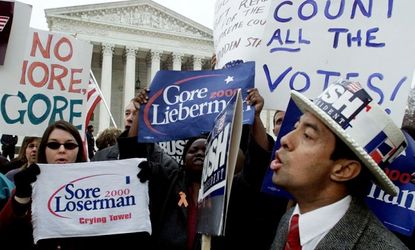Sandra Day O'Connor's second thoughts on the 2000 Bush v. Gore decision
The retired justice acknowledges that the ruling that put Bush in the White House hurt the court's reputation


Seven years after retiring from the Supreme Court, Sandra Day O'Connor is second-guessing what she says was the most controversial ruling of her 25 years on the high court — Bush v. Gore, which decided the 2000 presidential election. O'Connor — appointed by Ronald Reagan in 1981 — was the swing vote who gave conservatives a 5-4 majority, and put George W. Bush in the White House. She says now that the court only "stirred up the public" and "gave the court a less-than-perfect reputation" by stepping in to end Florida's manual recount, giving the state's electoral votes — and the presidency — to Bush. "[The court] took the case and decided it at a time when it was still a big election issue," O'Connor told the Chicago Tribune editorial board recently. "Maybe the court should have said, 'We're not going to take it, goodbye.'"
The retired justice's remarks triggered a barrage of commentary from the left. O'Connor is exactly right to say the Supreme Court should have butted out, says Taylor Marsh, reflecting some of those sentiments at her blog. "The U.S. Constitution is set up for handling these things, which would likely have meant a Bush presidency anyway." Of course, at the time O'Connor and her fellow conservatives weren't willing to gamble on "an outcome with roots in a founding document," because there was a chance it would have gone to Al Gore and the Democrats, says Marsh. So they made a political decision and essentially gave Bush the keys to the Oval Office. O'Connor now realizes "she ruined her reputation by siding with the slim majority and will never get it back, but now she'll have her mea culpa on the record," adds Marsh. "She's embarrassed about what she did, which as it should be."
O'Connor isn't the only one taking a fresh look at the case. Some liberals who were shocked at what they saw as a nakedly partisan decision now say they are seeing a positive side. In one sense, says Ian Millhiser at Think Progress, the controversial decision helped liberals out by damaging the reputation of the court's conservative majority. "If nothing else," he says, "Bush v. Gore demonstrates how justices who are determined to reach a certain result are capable of bending both the law and their own prior jurisprudence in order to achieve it. In Bush, the five conservative justices held, in the words of Harvard's Larry Tribe, that 'equal protection of the laws required giving no protection of the laws to the thousands of still uncounted ballots.'"
Subscribe to The Week
Escape your echo chamber. Get the facts behind the news, plus analysis from multiple perspectives.

Sign up for The Week's Free Newsletters
From our morning news briefing to a weekly Good News Newsletter, get the best of The Week delivered directly to your inbox.
From our morning news briefing to a weekly Good News Newsletter, get the best of The Week delivered directly to your inbox.
Despite the gloating, though, some have pointed out that O'Connor isn't saying the decision was wrong. As she told CNN's Wolf Blitzer in 2010, the decision was a tough one, but there's no reason to believe that, had the court allowed the contentious recount to drag on, Gore would have fared any better. "There were at least three separate recounts of the votes, the ballots, in the four counties where it was challenged, and not one of the recounts would the decision have changed. So I don't worry about it," she told Blitzer. Still, says Steve Chapman at the Chicago Tribune, "sitting justices are rarely forthcoming on the matters of most public interest, namely their political views and thoughts about the court's most controversial decisions." O'Connor has mostly "stuck to that habit," so it's interesting to hear her acknowledge that "the Supreme Court's decision in Bush v. Gore did its public reputation no good."
Sign up for Today's Best Articles in your inbox
A free daily email with the biggest news stories of the day – and the best features from TheWeek.com
Create an account with the same email registered to your subscription to unlock access.
Harold Maass is a contributing editor at The Week. He has been writing for The Week since the 2001 debut of the U.S. print edition and served as editor of TheWeek.com when it launched in 2008. Harold started his career as a newspaper reporter in South Florida and Haiti. He has previously worked for a variety of news outlets, including The Miami Herald, ABC News and Fox News, and for several years wrote a daily roundup of financial news for The Week and Yahoo Finance.
-
 'Colleges warn of punishment for disruptions'
'Colleges warn of punishment for disruptions'Today's Newspapers A roundup of the headlines from the US front pages
By The Week Staff Published
-
 Peter Murrell: Sturgeon's husband charged over SNP 'embezzlement' claims
Peter Murrell: Sturgeon's husband charged over SNP 'embezzlement' claimsSpeed Read SNP expresses 'shock' as former chief executive rearrested in long-running investigation into claims of mishandled campaign funds
By Arion McNicoll, The Week UK Published
-
 The murky role of military contractors in war
The murky role of military contractors in warThe Explainer A civil case against US company has revived debate over the increasing use of private security firms in military operations
By Richard Windsor, The Week UK Published